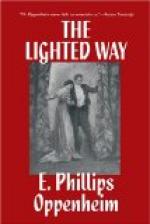“I am not,” Arnold assured him.
“Nor thinking of it?”
“Nor thinking of it,” Arnold repeated.
“When the time comes,” Mr. Jarvis said, “don’t you go poking about in any foreign islands or places. If only the governor had left those smelly European cheeses to take care of themselves, he’d be sitting here in his chair at this moment, smoking a cigar and handing me out the orders. You and I are, so to speak, in a confidential position now, Chetwode, and I am able to say things to you about which I might have hesitated before. Do you know how much the governor has spent during the last year?”
“No idea,” Arnold replied. “Does it matter?”
“He has spent,” Mr. Jarvis announced, solemnly, “close upon ten thousand pounds.”
“It sounds like a good deal,” Arnold admitted, “but I expect he had saved it.”
“Of course he had saved it,” Mr. Jarvis admitted; “but what has that to do with it? One doesn’t save money for the pleasure of spending it. Never since my connection with the firm has Mr. Weatherley attempted to spend anything like one half of his income.”
“Then I should think it was quite time he began,” Arnold declared. “You are not going to suggest, I suppose, that financial embarrassments had anything to do with Mr. Weatherley’s disappearance?”
Mr. Jarvis started. To him the suggestion sounded sacrilegious.
“My dear Chetwode,” he said, “you must indeed be ignorant of the resources of the firm when you make such a suggestion! I simply wished to point out that after his marriage Mr. Weatherley completely changed all his habits. It is not well for a man of his age to change his habits.... God bless my soul, here is an automobile stopping outside. If it should be Mr. Weatherley come back!”
They both hurried eagerly to the window. The automobile, however, which had drawn up outside, was larger and more luxurious than Mr. Weatherley’s. Count Sabatini, folding up his newspaper, made a leisurely descent. The cashier looked at him curiously.
“Wonder who it is,” he remarked. “Looks like some sort of a foreigner.”
“It is Mrs. Weatherley’s brother,” Arnold told him.
Mr. Jarvis was deeply interested. A moment later a card was brought in.
“Gentleman wishes to see Mr. Chetwode.”
“You can show him in,” Arnold directed.
Sabatini was already upon the threshold. He carried his gray Homburg hat in his hand; he seemed to bring with him a subtle atmosphere of refinement. The perfection of his clothes, the faint perfume from his handkerchief, his unusual yet unnoticeable tie—these things were a cult to himself. The little array of clerks, through whose ranks he had passed, stared after him in wonder.
“How are you, my young friend?” he asked, smiling at Arnold. “Immersed in business, I suppose?”
“We are very busy, naturally,” Arnold answered. “Please come in and sit down.”




